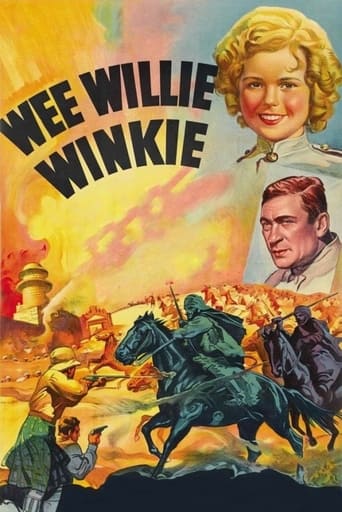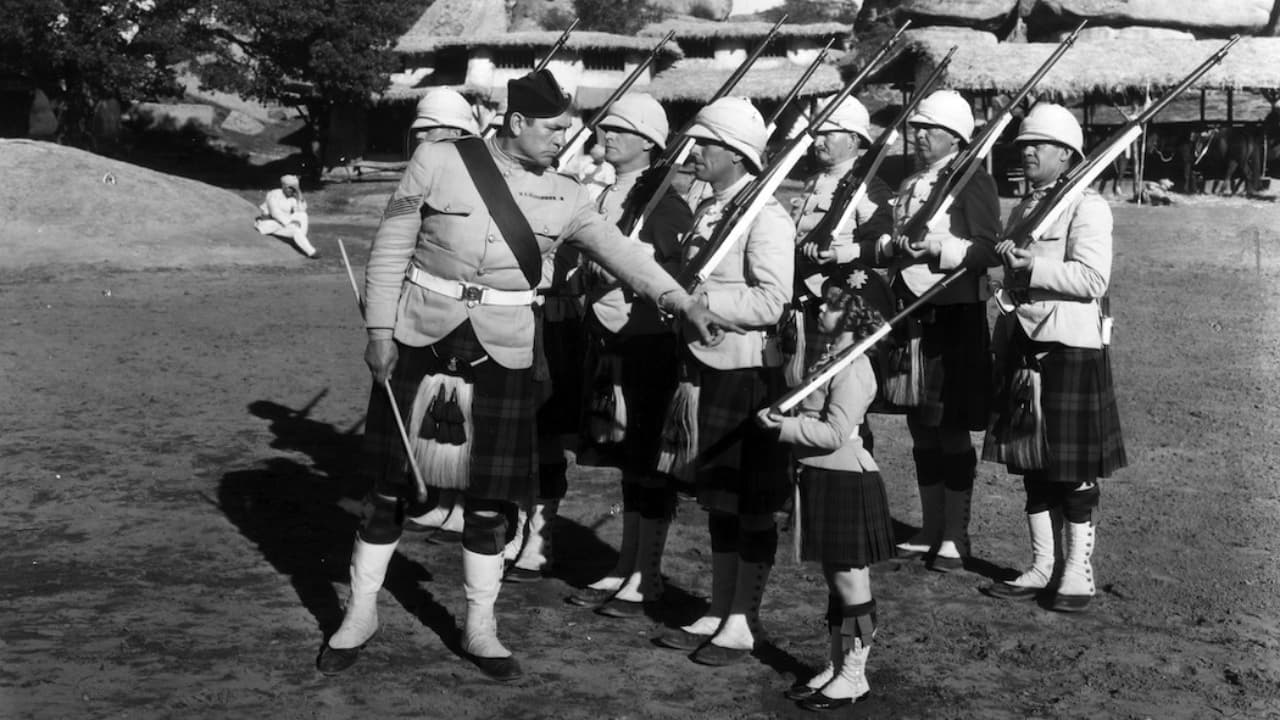weezeralfalfa
In this film, and in the subsequent similar-themed "Susannah of the Mounties", 'little miss fix it' graduates from reforming grouchy people or acting as matchmaker, to functioning as the very unlikely diplomat in bringing an end to ethnic warfare, here in the pre-Pakistan greater India-Afghanistan border region, and in the later film, on the Canadian rail-building frontier. Two other contemporaneous films dealt with the same subject: the prior Gary Cooper-starring "The Lives of a Bengal Lancer", and the first half of the Errol Flynn-starring "the Charge of the Light Brigade".There is considerable confusion about the ethnic affiliation of the Khoda Khan-led marauders, usually described in film summaries as Indian tribal renegades. However, several clues identity them as Afghan tribals. Both Colonel Williams(C. Aubrey Smith) and Sergeant MacDuff(Victor McLaglen) speak of them as Pathans, which is a sometimes- used alternative term for Afghans. Also, the story is sited near Khyber Pass, which was in the center of the region controlled by the Pathans. Their Pathan identity is confused by their wearing turbans characteristic of the Indian Bengal Lancers(included in the film) or rather similar ones worn by Sikhs, rather than the standard Afghan turban.Director John Ford has his Indian Army unit composed of a majority of Scottish kilt-clad infantry(all apparently being of Scottish origin!), and a small contingent of native Bengal Lancer cavalry. It's quite a stretch of plausibility that the infantry could march within a day from the British fort to Khyber Pass! Scottish bagpipes are heard frequently throughout the film, especially when the troops are drilling, parading or marching out on patrol. "Coming through the Rye" is the favored tune. Ford would again indulge his penchant for parading cavalry accompanied by a popular traditional song a decade later, in "She Wore a Yellow Ribbon".Victor McLaglen gets to practice his role as the cut up top sergeant in the decade-later Ford cavalry films "Fort Apache" and "She Wore a Yellow Ribbon". With John Wayne playing the peacemaker role played by Shirley in this film, the screenplay of the present film more resembles that of the latter film. However, it's in "Fort Apache" that we again encounter both Shirley and McLaglen, although their relationship is then quite different, of course.As in the subsequent "Susannah of the Mounties", Shirley sometimes has a boy companion, with whom she has a largely antagonistic relationship, being largely dismissed as a mere little girl, which only encourages her to show that she can be a significant person in a non-traditional feminine way within the military community. The skirmish-related death of her friend Sgt. McDuff is an additional incentive to try to convince Khoda Khan and his bunch to voluntarily give up their traditional lives of plundering merchants who must negotiate the vital Khyber Pass to reach their destinations, rather than having to face the wrath of the British Army to force them to do so. Of course, little Shirley faces the initial ridicule of the British infantry, with her ambition to dress and act like a soldier, and the equal ridicule of the Pathans , when she journeys to their stronghold to plead with KK to end his plundering ways. Of course, she is not deterred, against all odds, succeeding in both missions. The film ends with Shirley's victorious smiling face filling the screen, in full uniform, saluting the troops parading by.Gruff old Aubrey Smith joined a list of older character actors portraying set-in-their-ways grandfathers, grandmothers, aunts, etc., whom Shirley must charm and demonstrate that it was possible to change for the better what they considered insolvable problems. Perhaps the subliminal take-home message was that solving The Depression, which lingered despite all the New Deal policies, might require input from an unexpected source, as indeed it would, with the unofficial, then official, participation of the sleeping US industrial and military establishments in the most intense war the world had ever seen: an ironic twist on Shirley's pacifist solutions.Shirley again charms with her naïve little girl questions and antics. Her initially difficult relationship with her female-shy grandfather somewhat reminds us of her rather similar relationship with her reclusive grandfather in "Heidi". As children do, she occasionally blurts out the wrong word for something, suggesting that her grandfather is a 'cauliflower', which he corrects to 'wallflower', when it comes to dancing.June Lang graduated from playing Shirley's school teacher in "Captain January", to her widowed mother in this film. She was a good looking blond, who is adequate for the role, but lacked striking charisma. The bland, if handsome, Michael Whalen(Lt. Brandes), who played Shirley's widowed father in "Poor Little Rich Girl", returns to play June's new love interest, hence Shirley's potential father-in-law. Bunny Beatty plays a rival available debutant for the attention of Lt. Brandes, egged on by her haughty mother, but ignored by Brandes. Handsome Cesar Romero is barely recognizable, with his turban, as Khoda Khan. Although raised in NYC, he was of Cuban parentage, hence was usually cast as a Latino or other exotic. Unfortunately , assumed audience ethnic prejudice mostly limited this talented comedic or straight actor to secondary roles, and the loser in romantic contests over the leading lady.
MartinHafer
"Wee Willie Winkie" is a very, very schmaltzy film. In addition, it is one of many films of this era that strongly reinforced the notion that British imperialism was wonderful (as an American, I never understood why we make pro-imperialism films like this, actually). So, for those two reasons I should hate the film...but I just couldn't.The film begins with a mother and daughter (Shirley Temple) arriving in India to live with the child's paternal grandfather--who is the Colonel in charge of a Colonial regiment (circa about 1890). It seems that the child has never met the old man and the pair have come there because they are destitute. For the mother, adjusting to India and the loneliness of camp life is tough, but for perky little Shirley, it's a snap. She is seen as a sort of regimental mascot. And, I must say that the child was freakin' adorable dressed up in a cute little uniform.Everything seemed pretty cool (except for the mother) until the wicked Khoda Khan (Cesar Romero) escaped custody. This villain had the effrontery not to want to become 'civilized' and a loyal subject of the Queen (sarcasm intended)! And, when little Shirley is abducted and taken to him, things look pretty grim. After all, the British just want to be their friends (and enslavement, but that's only a trifle).All this is packaged in a very attractive sepia-toned package. Some of this is due to Shirley's amazing acting, some is because the film was directed by the king of sentimental films, John Ford. And, some was because of Victor McLaglen's wonderful portrayal of the Sergeant and C. Aubrey Smith as the Colonel. Overall, despite its faults, the film is hard not to like and it is exceptionally well made.By the way, it was very strange seeing Willie Fung in this film. Not only did he usually play a Chinese man (as he was of Chinese origin) but instead of the rather dim but affable sort, here he plays someone quite evil and blood-thirsty! For fans of old Hollywood films, this should come as a bit of a surprise.
Amy Adler
Priscilla Williams (Shirley Temple) and her mother go to British-controlled India to reside with Colonel Williams, Priscilla's grandfather. Mother has been left a widow upon the death of her husband and this is the only option. Mrs. Williams doesn't really like the change, but wee Priscilla is enchanted by her new environment. This, in spite of the fact that the Colonel has no idea how to deal with little girls and comes off quite gruff. As can be predicted, she soon melts his heart. In addition, since the grandpapa only knows military life, Priscilla aspires to be a "little soldier". Thus, a tiny replica of the army's uniform is made for her, with the helmet-hat that everyone wears to prevent sun stroke. She is coached in military ways by Sergeant MacDuff (Victor MacLachlan) who also adores the tiny gal. It is he who gives her the name Wee Willie Winkie, since soldiers are rarely called Priscilla. One day, at the market, she sees that a religious token has been dropped outside a window and, picking it up, she gives it back to the owner through iron bars. Yes, he, Kodha Khan (Cesar Romero) is a prisoner. He is so grateful to her and strikes up a friendship. But, alas, he also has plans for a prison break out. A friend uses Winkie to deliver a letter that will "bring peace" to the Khan's heart. If you guessed it writes of "spring me plans", you are correct. Tensions, you see, are high between these Muslim Indians and the British. The breakout takes place. Meanwhile, something happens to MacDuff that changes everything. Soon, Winkie is on her way to make peace with Khan and save the regiment from disaster. Can a small child diffuse a dangerous situation? You bet, when its our Shirley! I count myself, easily, as a gigantic Shirley fan from childhood on and this one was, and remains, a favorite. The story, based on a Kipling work, is unique and beautiful, promoting peace at every turn. Also, the India setting has great charms for those who will never visit the country while the cast is terrific. MacLachlan's performance is so touching, tears will fall from everyone at a critical moment while Romero does nice work, too. The supporting cast is fine as well but, as always, Temple puts on a show well beyond her tender years. Are you just discovering the movies of one of America's treasured child stars? Don't miss this one!
moonspinner55
Showcase for Shirley Temple, produced on a much grander scale than most of her vehicles, has the feisty youngster and her newly-widowed mother traveling to war-torn North India in the late 1800s to live with Shirley's estranged paternal grandfather, a colonel stationed with the British Army. Loosely adapted from a Rudyard Kipling story, with some exciting set-ups and sequences at the outset; but, sadly, the picture runs out of intriguing ideas before the finale. Director John Ford seems to lose track of the supporting characters in an attempt to resurrect the typical Shirley Temple scenario, although Cesar Romero is well-cast and memorable as Khoda Khan. Handsome, to be certain, but not one of the diminutive star's better efforts. ** from ****



 AD
AD


